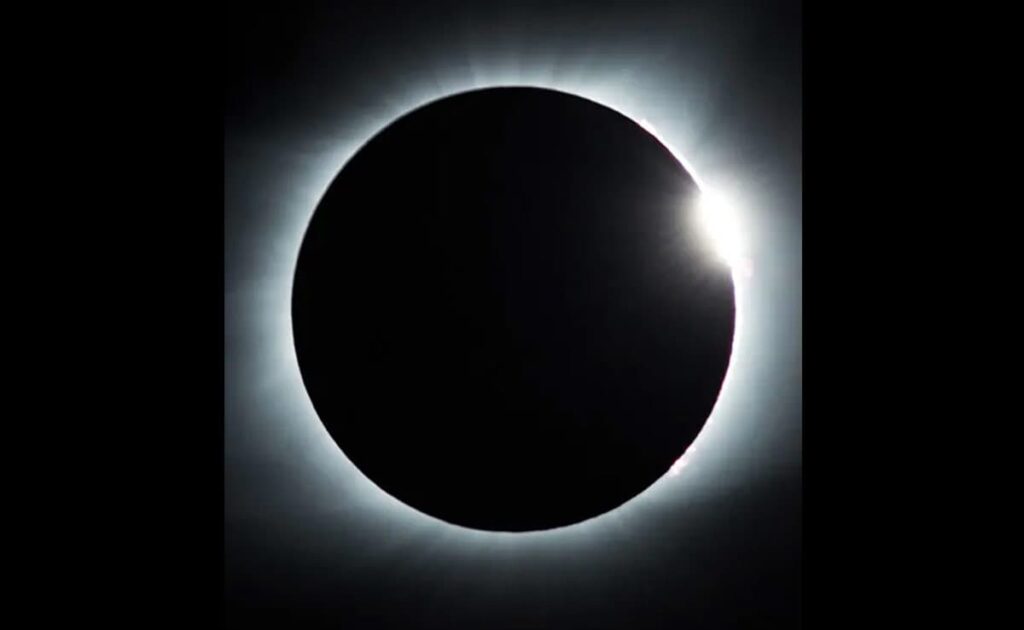Total Solar Eclipse 2024: The peak spectacle is expected to last for up to 4 minutes and 27 seconds
An astronomical spectacle is all set to captivate skywatchers as a total solar eclipse is set to grace the skies across North America, turning day into night, on April 8. Total eclipses are dramatic and turn the sky dark, but they are only visible from a few locations. This is why the opportunity to experience an eclipse is often called a once-in-a-lifetime opportunity.
What is a Solar Eclipse?
A solar eclipse is an astronomical phenomenon where the Moon passes between the Earth and the Sun and blocks the Sun’s light either entirely or partially.
When the moon completely covers the sun, it casts a shadow on Earth, forming what is called a “path of totality.” This path is a relatively narrow band that moves across the surface. People standing inside this band can witness a total solar eclipse, provided the weather and clouds cooperate. In the path of totality, where the Moon completely covers the Sun, the sky will become dark, as if it were dawn or dusk.
Unless people are on that line—the path of totality—they will only see a partial eclipse. For them, the sky will appear slightly darker than it was before the eclipse, depending on how much the Moon blocks the Sun in their location.
Total Solar Eclipse Date and Timings:
The total solar eclipse of 2024 will occur on April 8. The total darkening of the sky, also known as totality, will be visible across a 185-kilometre stretch between Mexico, the US, and Canada. As many as 18 different US States will also get to see it. However, it won’t be visible to skywatchers in India,
According to the Indian Standard Time (IST), the total solar eclipse will begin at 9:12 pm on April 8, totality will start at 10:08 pm, and will end on April 9, 2024, at 2:22 am. The Pacific coast of Mexico will experience totality first, around 11:07 am PDT, and the occurrence will leave Maine at around 1:30 pm PDT.
Total Solar Eclipse Duration
The whole event will take about two and a half hours, but totality will only last about four minutes. As per NASA, the peak spectacle is expected to last for up to 4 minutes and 27 seconds in the path of total darkness.
“The duration of totality will be up to 4 minutes and 27 seconds, almost double that of The Great American Eclipse of August 21, 2017,” according to Great American Eclipse. Most places along the centerline (path of totality) will see a totality duration between 3.5 and 4 minutes.
How To Safely View the Eclipse?
The Sun’s surface is so bright that if you stare at any portion of it, no matter how small, it produces enough light to damage individual retinal cells. Skygazers across the world have been advised to wear protective eyewear, such as licensed eclipse glasses, during its partial phases. Failure to do so can burn your eye’s retinas and cause permanent damage or even blindness.
Total Solar Eclipse: How To Watch It Online?
If you cannot witness the solar eclipse in person, you can tune in to NASA’s live stream. The space agency will start its live stream on April 8 at 5:00 pm GMT (10:30 pm IST) and continue until 8:00 pm GMT (1:30 am IST).
During the broadcast, NASA will also be sharing conversations with experts and providing telescope views of the eclipse from several sites along the eclipse path.
You can also check out the live stream hosted by the McDonald Observatory in Texas. Skywatching website timeanddate.com will also live stream the total solar eclipse on its YouTube channel starting at 4:30pm GMT (10:00pm IST) on April 8.
